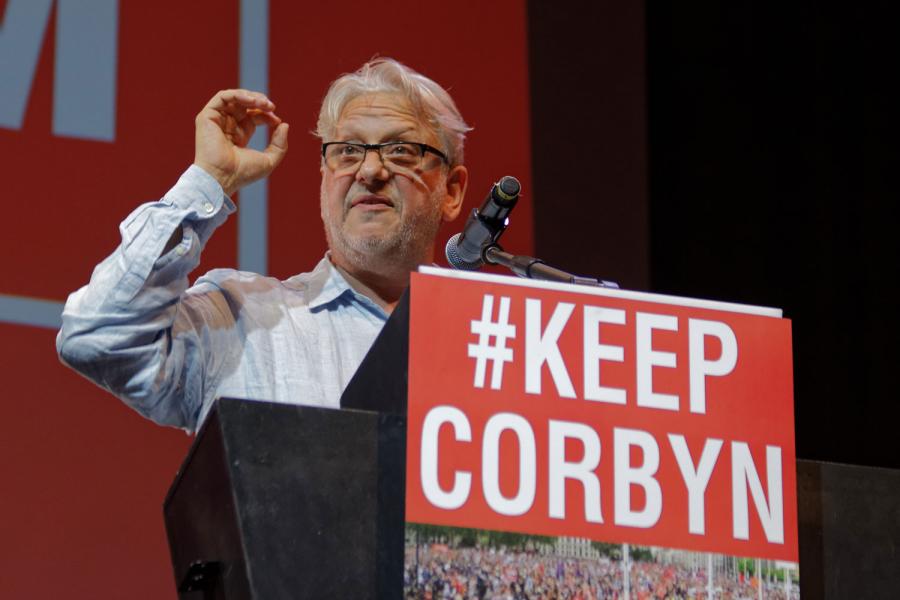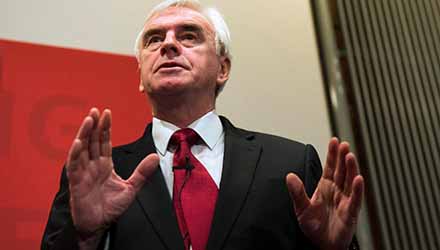The manoeuvres over joint candidates for Labour’s disciplinary committee exposes the political vacuity of the existing left groupings, says Carla Roberts.
If any more proof was needed that the organised Labour left is in deep trouble, the last week has surely provided it.
Since its foundation in 1995, the Centre-Left Grassroots Alliance has operated as an underground club, to which only a few lucky reps of approved groups are invited. This thoroughly undemocratic and unaccountable lash-up has always taken it upon itself to ‘recommend’ various candidates for Labour Party internal elections – consistently guided by its original assumption of the necessity of reaching out to ‘honest’ moderates.
For many years, the CLGA stuck to its mantra that the only way to defeat the Blairite right was through an alliance with centrist candidates, and rejected any moves to present an openly leftwing platform. This hopeless perspective explains how Ann Black could remain on the CLGA ticket for so long, despite being very much on the centre-right of the party.
Despite its name, the CLGA’s two main current constituent parts – Momentum and the Campaign for Labour Party Democracy (CLPD) – are, of course, both on the left of the party. But they have now fallen out quite spectacularly over which six candidates to support for the newly-expanded national constitutional committee (NCC). This is a crucial body in the Labour Party. It deals with all disciplinary matters that the national executive committee feels it cannot resolve and – given that it is dominated by the right – the referral of a left-winger to the NCC usually results in expulsion from the party. Incredibly, even after its expansion from 11 to 25, only a minority are to be chosen by rank and file Labour members. The rest are appointed by affiliates, which explains why in the last few crucial years, the NCC could be so (badly) chaired by Maggie Cousins, a delegate from the rightwing GMB union.
After three meetings, the CLGA talks deadlocked on October 10, apparently because Momentum (aka Jon Lansman) refused to support Stephen Marks, a member of Jewish Voice for Labour, which has been included in the CLGA negotiations for the first time. Lansman tried to veto Marks, allegedly arguing that “‘the Jewish community’ will not tolerate a JVL representative”.
So, on the morning of October 11, the CLPD simply put out its own slate of candidates, which included Stephen Marks. The slate was also supported by JVL and the “Labour Campaign for Nuclear Disarmament”. (The whole CLGA project has the definite whiff of ‘Potemkin Village’ about it. Jon Lansman, for example, is representing two organisations – Momentum and his own blog, Left Futures, which is so crucial to the labour movement that its latest entry is dated February 5). After a lengthy discussion, the Labour Representation Committee also decided to support the slate, despite the fact that the only candidate they put forward, LRC treasurer Alison McCarty, was rejected by both the CLPD and Momentum.
Momentum published its slate later the same day. And indeed, it did not feature Marks (though there were three candidates who were also on the CLPD/JVL slate: Khalid Moyer, Cecile Wright and Annabelle Harley). Now Lansman let it be known that Momentum “had been prepared to back Stephen Marks”, but did not include him because of ”concerns about the geographical balance of the CLPD slate”. Or, in Lansman’s own unconvincing words: “Half of CLPD’s slate live in London or the south-east. So do three out of four of the existing CLP reps”, he tweeted . This transparent obfuscation over “concerns with the geographical balance” reminds us of his crass attempt to bullshit his way out of his ill-judged attempt to become Labour’s next general secretary. Remember, he claimed then that his only motivation in standing was to increase the gender balance – oddly enough, by standing against a woman, Jennie Formby!
What do they stand for?
Lansman opposes Marks for political reasons, of course – not geographical ones. Stephen Marks has written about how the problem of anti-Semitism in the party has been “exaggerated and weaponised by JC’s enemies”. Clearly that makes him, in Lansman’s view, the ‘wrong kind of Jew’. Which also reveals as utter bullshit Lansman’s claim that Marks could not represent “the Jewish community” (our emphasis). There is no uniform, politically homogeneous Jewish community – the simple fact of the existence of Jewish Voice for Labour proves that. There are pro-Zionist Jews and there are anti-Zionist Jews – and that is just for starters. Politically, in today’s toxic climate, you cannot get two more implacably opposed viewpoints in the party. We know which of the two viewpoints Lansman supports.
He has been on the wrong side of the Labour witch-hunt from the start: a soft Zionist who has argued for the party to adopt the full ‘working definition on anti-Semitism’ put out by the International Holocaust Remembrance Alliance – including the full list of highly disputed “examples” that effectively bans criticism of the state of Israel. ’Zio’, the diminutive form of ‘Zionist’, should be banned as ‘insulting’, according to him. And don’t forget, Lansman – alongside Margaret Hodge (that charmer who branded Jeremy Corbyn a “fucking racist and anti-Semite”) – recently attended a conference organised by the Jewish Labour Movement. Readers will not need reminding that this outfit supports and aligns itself with the Israeli Labor Party: that is, the foul organisation that orchestrated the nakba (the forced expulsion of 800,000 Palestinians in 1948) and which presided over the colonialist conquest of the Golan Heights and the West Bank in 1967. Momentum’s constitution – enforced by Lansman after his coup – bans from Momentum membership anybody expelled from the Labour Party. It internalises the witch-hunt, in other words.
The farce continued when a candidate on the CLPD slate withdrew: “We understand that Kaneez Akhtar has been put under pressure to withdraw,” the CLPD’s statement read. “We are seeking further info and if true will ask another BAME woman candidate to put her name forward.”
Put under pressure by whom, exactly? We are not told. But apparently, it had something to do with the fact that Jabram Hussain, a candidate on the Momentum slate, is the brother of Bradford East Labour MP Imran Hussain and that Kaneez Akhtar is a Labour councillor for Bradford City. We can only guess at the power games being played out here. She was replaced by Sonia Klein, who, like Annabelle Harle, is a member of Welsh Grassroots Alliance (we can only guess how Jon Lansman must have suffered under this geographical and gender imbalance).
Of course, the whole Labour left went berserk over there being two rival leftwing slates. But, after a week, ‘harmony’ was again restored on the morning of October 17. Momentum released a press statement: “Following our call to reopen negotiations, we’re happy to announce a joint list of candidates backed by Momentum and CLPD.” Clearly, they did not even bother inviting any of the other organisations who are officially part of the CLGA. The agreed candidates are Cecile Wright, Khaled Moyeed, Annabelle Harle, Susan Press, Gary Heather – and, wait for it, Stephen Marks.
So, the new “negotiations” basically led to Momentum collapsing and accepting Stephen Marks after all. In turn, the CLPD now supports Susan Press (a councillor and Lansman loyalist, who had been put forward by Momentum for all sorts of other positions in the past). Sonia Klein and Michael Menear, another loyal Lansman supporter and member of Momentum’s national coordinating group (NCG), have been dumped. Not that they matter, to be quite frank. The real disagreement was always over Stephen Marks.
Apart from Marks, who has written on the question, we have to guess what these candidates think about the witch-hunt in the party, the necessary reforms of Labour’s disciplinary process or the IHRA definition of anti-Semitism. The CLPD and Momentum give us some short information about the colour of their skin and where they live – but no politics at all.
It does not bode well that both Momentum and the CLPD have been very quiet on the witch-hunt against Corbyn and his supporters. When Willsman was accused of anti-Semitism (see below), he incredibly chose to publish an apology and referred himself for equalities training … when clearly the witch-hunters deserved a two-fingered reply. Both Willsman and Lansman support Cecile Wright for the NCC – it was she who smoothly and swiftly replaced Jackie Walker as Momentum’s vice-chair when she was first suspended from the Labour Party on false charges of anti-Semitism. Can we really rely on her to speak up for other members who are similarly falsely accused?
Kaneez Akhtar, the CLPD candidate from Bradford who eventually withdrew, said in an interview: “I fully support the IHRA definition on anti-Semitism and was indeed proud that Bradford council adopted this definition.” The acceptance of the IHRA by the NEC has already led to an increase in suspensions and investigations, as it dramatically widens the definition of what constitutes anti-Semitism (calling Israel a “racist endeavour”, for example). How on earth did she end up on a ‘left’ slate?
Labour Against the Witchhunt seems to be the only organisation that has asked the candidates some pertinent political questions. That is a much better approach, in our view. But, for the time being, we have to guess about the politics of the other candidates. We fear that – apart from Stephen Marks – no other candidate can be relied upon to challenge the false narrative that the Labour Party is awash with anti-Semites. That is a truly worrying state of affairs.
Lansman humiliated
The joint CLPD/Momentum slate represents without a doubt a new political humiliation for Jon Lansman. Pretty much all leftwing organisations had backed the CLPD slate, while Lansman’s was supported by Momentum – and nobody else. Funnily enough, even Lansman’s former NEC ally, Christine Shawcroft, came out for the CLPD: “The only result of supporting the Momentum ‘slate’ for the NCC will be getting rightwingers onto the NCC,” she wrote on Facebook. Did we mention she is a director of Momentum Campaign (Services) Ltd?
Most local Momentum groups who said anything on the matter also fell in behind the CLPD slate. We hear of a number of frustrated Momentum members setting up ‘secret’ WhatsApp and Facebook groups to start organising around Momentum nationally. An online petition of “active members of Momentum” who are “increasingly concerned about the lack of democracy in Momentum” is spreading like wildfire.
No doubt, Momentum is in deep trouble. Yes, Lansman still owns the data of tens of thousands of Corbyn supporters. But politically, he has managed to make one huge mistake after another, shedding support and members in the process. It all started with his coup of January 10 2017, when he simply abolished all democratic structures in Momentum, imposing his own constitution on the organisation.
But dumping Pete Willsman from the slate for the NEC elections earlier this year was the real turning point for many. Willsman, long-term secretary of the CLPD, was a victim of the witch-hunt directed against Corbyn and his supporters. His comments, recorded at a closed NEC meeting and leaked to the press (by whom, we wonder?), forcefully called into question the ‘anti-Semitism problem’ in the party. While someMomentum members followed Lansman’s toxic advice not to vote for Willsman, he was nevertheless re-elected to the NEC (albeit with a smaller share of the vote than the rest of the CLGA slate).
This was followed by Lansman’s collapse over the question of mandatory reselection at this year’s Labour conference. Despite the fact that over 90% of delegates wanted to discuss the issue (and presumably vote in favour of it), Lansman urged Momentum supporters to vote against. Few people followed his advice and, in the next vote, 75% of delegates continued to support open selection.
Clearly, Momentum enjoys less and less political authority amongst the Labour left. Some people seem to think that it can be reformed: the petition quoted above, for example, demands that “minutes from all past meetings” are published, “calls on the NCG to oppose individual opinions that are not in line with Momentum members” and “calls on the NCG to be accountable and contactable, and carry out a review of the structure and democracy of Momentum with widespread input from members”.
Obviously, none of these rather naive demands would change how Momentum is run. There are probably some more radical ideas being discussed right now. But this monstrosity of an organisation cannot be reformed. The constitution imposed by Lansman makes sure of that. Both organisationally and politically, it is deeply flawed. Yes, it has played a relatively useful role in getting Corbyn re-elected and has organised some useful training for local party members. But it plays no real role in educating, politicising or even just organising its 30,000 or so members. They are treated as mere voting fodder.
Flawed method
Lansman and Willsman are old comrades – and it shows. They are both presiding in pretty unaccountable fashion over their respective organisations. In March this year, they first came to blows over which candidates to support in the elections to the NEC. Lansman refused to continue backing Ann Black. Quite right, in our view – and long overdue. But Pete Willsman insisted on giving her support – he had worked well together with her on the NEC, despite some political differences. He even, undemocratically, overruled his own executive committee’s decision to drop her from the CLGA slate. So Lansman simply leaked his nine candidates to the press – minus Ann Black, of course (at this point the list still included Pete Willsman).
For decades, Willsman and Lansman worked together in the CLPD: both feature in a very entertaining BBC drama, which shows how the CLPD successfully fought for mandatory reselection in the Labour Party back in 1980. Funnily enough, as soon as Jeremy Corbyn was elected Labour leader, both gave up the fight for this important leftwing principle: CLPD dropped it; Momentum never adopted it. In this, they were following Corbyn’s lead. Unfortunately, he still attempts to appease the right, in the vain hope that this will keep the centre on board and thus eventually neutralise the right.
This is tactically inept, of course. The majority of Labour MPs have been plotting against Corbyn from day one, if not before. Should he become prime minister – which is far from certain, even if Labour wins the next general election – he would be held hostage by the Parliamentary Labour Party. In all likelihood the right would try one manoeuvre after another to get rid of him. By refusing to back mandatory reselection (aka open selection) at conference, which would have allowed the membership to rid the PLP of the anti-Corbyn right, Momentum and the CLPD (as well as Corbyn himself) seriously undermined the leader’s position.
This is very much in line with the old political method of the Labour left: getting the Labour Party into 10 Downing Street trumps everything. Open criticism of the party’s flawed programme or the Labour leader are taboo, as they could harm electoral prospects. Political differences are treated as a huge problem, to be kept under wraps. Socialist politics are hidden, because they could be perceived as unpopular.
This latest farce ought to spell the end of the CLGA. Its politics and methods belong to the scrapheap of history. We fear, though, that even if it was killed off, it would probably be replicated under another name – reborn as an organisation with the same flawed political method. After all, programmaticallythere is very little that distinguishes Momentum and those Labour left organisations that supported the CLPD slate. Neither organisation involved in these abortive subterranean negotiations have seen the need for transparency on any of the political differences involved, let alone the views of the candidates they support.
Clearly, there is a huge space for a principled organisation of the Labour left that criticallysupports Jeremy Corbyn, fights against the witch-hunt and campaigns openly for socialism and the thorough democratisation of the party and the left itself. Reporting openly and honestly about what is going on must be an integral part of the culture of such a new organisation.






